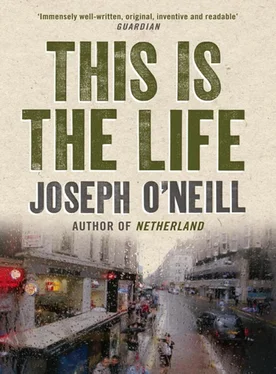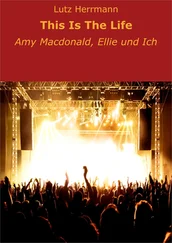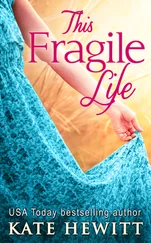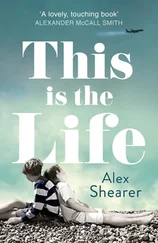A burning down-in-one later, I made for the front door. The mail, I thought. I had almost forgotten all about it. I bent down on a knee and rummaged around. There was nothing of interest as far as I could see. Recent portions of law reports, letters from the bank, unexciting brown envelopes and junk mail. Nothing from Arabella or her solicitors. Then, straightening up, it occurred to me that I should check the ansaphone. Perhaps the solicitors, or Arabella herself, had left a message for Donovan there. Donovan would want me to satisfy myself on that score, I reasoned.
There was only one message, spoken in a mild Irish accent. ‘Michael, this is your old man. Son, I’m coming to London on the 6th of November. That’s a Sunday. I’m just over to do one or two things. I’ll be staying at the Savoy for a week or two. Could you give me a ring as soon as you can? Bye, son. Thanks.’
The 6th. That was tomorrow. It looked like Donovan Sr was out of luck, because his son would not be back for weeks. He sounded friendly enough, I thought, as I walked to the door. Then I thought that it was a funny thing, Donovan having a father. This was a silly thing to think, I know, but Donovan was not a man you associated with mundanities; the idea of him as his father’s son had never occurred to me. In the way that you never see a movie star straining on the lavatory, there were certain human functions which seemed to pass Donovan by, at least in my observation. He defied, as far as I was able to tell, the forces of gravity that anchor the rest of us down to earth, the downward tug of the kids, the dishes, the emotions. Donovan was up there in the atmosphere, in that azure above the weather zone, occasionally touching down to resolve the frictions of nations. It seemed almost unnatural, unwholesome even, for a man like that, an astral sailor, to be earthbound by something as prosaic as a father.
I did not ponder it any further. All I wanted was to go, to leave the whole evening far behind me. I replaced the key inside the railing and in my urgency began jogging along the dark and wet street towards my car — when it struck me that all those whiskies had put me over the limit. I would have to take a taxi. There was no question of a man of my position, a lawyer with a reputation to protect, being convicted for drink driving; and besides, the minimum disqualification period of one year deterred me in any event. The car I could come back for tomorrow.
It is a Sunday morning. I am sitting in a chair in my back garden, watching the insects clocking in and clocking out on the flowers, envying those bees their job sites. Although I am no gardener, I take pleasure in this little patch of nature that is mine. My predecessor took great pains to introduce to the soil a varied and durable flora, and he conveniently inserted small plastic identification-tabs next to the shrubs he planted. That is how I know, for example, that over there that is a forsythia which blooms in those yellows. Without those tabs I would not know what was growing in those beds. Behind the forsythia, at the back of my garden, is a crumbling brick wall which separates my property from the neighbours’. Wild and acrobatic cats, real down-and-outs with chewed-up, clawed-at fur, are always running along the wall, looking for trouble, trapezing over fences erected in their paths or rolling up into orange balls for a snooze.
Taking my cue from those tomcats, I close my eyes for a moment. The sun heats my ears. Somewhere a dog barks, somewhere else someone is hammering at wood, sinking the nails with sharp reports until they disappear. Blat, blat. Blat, blat. There is, I realize with surprise, a cacophony in the air. The tweetering of urban birds in the skimpy trees and on the rooftops, the conversation of a gang of churchgoers, the sounds of water falling down a drainpipe, a hullabaloo of sirens from the direction of the tower blocks, the yelps of children, another dog barking and, now, Edith Piaf resounding from an open window.
This morning I envy goldfishes too. Living in the pure present, swishing and circling around their bowls, each minute a brand-new world. I am tempted, in this untutored early spring warmth, to forget all about this Donovan business. To close my eyes on the past. To wake up, to live in the here and now. That is, after all, where I used to live. Susan remarked upon it once. We were walking from her flat to the tube together one morning. We walked side by side, holding our briefcases. We overtook a couple in their mid-twenties on their way to work. They had reached the crossroads at the end of the street and their paths were about to diverge — he was going right, she left — and they were kissing. It was an old-fashioned spectacle; he held her in his arms and she was on tip-toes, her mouth turned upwards and expectant. I had seen these two together before and knew they could not walk down the street without continuously hugging, squeezing and making eyes at each other. It was the man, in fact, who made the nuzzling, pawing advances; the woman made little attempts to take avoiding action, wiggling and ducking until, delightedly, she allowed herself to be snared and kissed. She would then push him away and then, after a few paces, the whole thing would start again. According to Susan, this was how they were every day, first thing in the morning. Anyway, that particular morning we saw them break from each other at the crossroads and head off in opposite directions along the avenue. Susan and I were on the other side of the road, but we could clearly see the two of them. With every five steps they took they turned round, cocked their heads and sent each other a little wave of the hand. Maybe this set Susan thinking, because she frowned and said, ‘Jimmy, you know, I think we live in different …’ She paused, struggling with her words. ‘I think we’re not living at the same time as each other. Do you know what I mean?’
I hesitated. I was not sure what she meant. ‘Yes,’ I said. I had to admit it, there were times when I did have the impression that we inhabited different time zones. Sometimes, when we spoke and our words overlapped and interfered with each other, it was as though we were speaking on the telephone from different corners of the globe and were not where we were, in bed together in England. It felt as if it was morning where she lay and that I lay twelve hours away, in the middle of some intercontinental night. But I was not sure that this was what Susan meant.
‘Where would you say you lived, Jimmy? In the past or the present or the future?’
We were walking past a newsagent’s and we stopped while I bought a newspaper. Susan’s question took me unawares. It was, I suspected, a very good question. It went straight to the heart of something — quite what, I was unsure, but it flew like an arrow. I paid the newspaper man his money.
‘How do you mean?’ I asked.
She was frowning. Like me, Susan is not blessed with particularly fetching looks. Her hair is shoulder-length and falls in mousy, lanky strands, like rain. Her ankles are on the thick side and although she is small, due to her slightly bulging physique she is not petite. Her best feature is her skin, and her eyes, too, are pleasantly bright when she removes her glasses.
‘I live mainly in the future, but also in the past,’ she said. ‘I’m not like you. You’re lucky, you just live from day to day — I bet you don’t even know what you’re doing tomorrow, do you?’ She was right, I did not. I had no plans for the next day. ‘I’m not very happy with things,’ Susan said simply. ‘That’s why I have to look forwards and backwards to things.’
This was Susan all over. This was the sort of thing she always thought about. It put me under pressure, all this talk of happiness, all this analysis.
Читать дальше
Конец ознакомительного отрывка
Купить книгу












